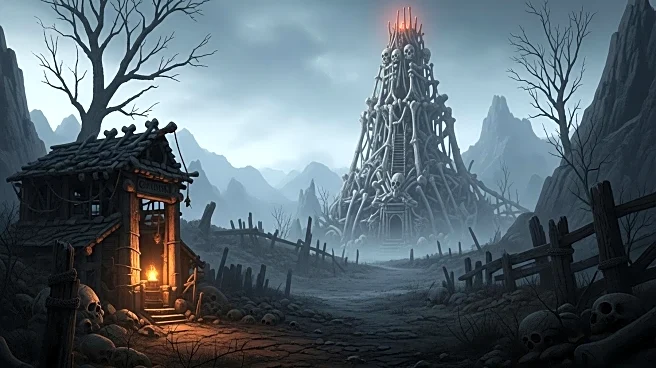What's Happening?
The debut trailer for '28 Years Later: The Bone Temple' has been released, showcasing Ralph Fiennes as Dr. Kelson in a post-apocalyptic world. Directed by Nia DaCosta and written by Alex Garland, the film is a sequel to '28 Years Later' and continues the narrative established by Danny Boyle and Alex Garland. Cillian Murphy, listed as an executive producer, will briefly reprise his role as Jim from '28 Days Later' before appearing more extensively in a third installment. The film explores the inhumanity of survivors as a greater threat than the infected, with Dr. Kelson discovering a potentially world-changing entity. The movie is set to hit theaters on January 16, 2026.
Why It's Important?
The release of '28 Years Later: The Bone Temple' is significant for fans of the franchise, as it expands upon the themes of survival and human nature in a post-apocalyptic setting. The film's exploration of the darker aspects of humanity could resonate with audiences, reflecting societal issues and cultural strife. The involvement of notable actors like Ralph Fiennes and Cillian Murphy, along with the creative team of Nia DaCosta and Alex Garland, suggests a high-quality production that may attract a wide audience and generate discussions on the ethical and moral dilemmas faced in extreme situations.
What's Next?
With the film's release scheduled for January 16, 2026, anticipation is likely to build among fans and critics. The continuation of the story may lead to further sequels, expanding the universe created by Danny Boyle and Alex Garland. The film's reception could influence future projects and collaborations within the genre, potentially setting new standards for post-apocalyptic narratives. Stakeholders in the film industry will be watching closely to gauge audience reactions and box office performance.
Beyond the Headlines
The film's focus on the inhumanity of survivors rather than the infected presents an opportunity to explore deeper ethical and cultural implications. It challenges viewers to consider the impact of societal breakdown on human behavior and the potential for moral decay in the absence of structured governance. This narrative could spark conversations about resilience, community, and the human capacity for both compassion and cruelty in dire circumstances.









